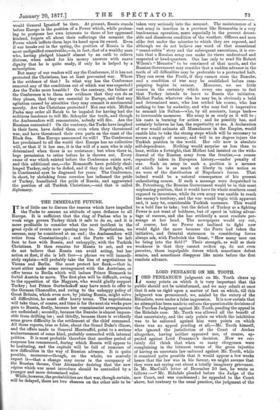THE IMMEDIATE FUTURE.
IT is of little use to discuss the reasons which have impelled the Turks to assume an attitude of open defiance to all Europe. It is sufficient that the ring of Pashas who in a
weak reign govern Turkey think it safe to do so, and it is more profitable to consider what the next incident in the great cycle of events now opening may be. Negotiations, we
assume, may be considered at an end ; the Ambassadors will retire from Constantinople ; and the Porte will be left face to face with Russia, and unhappily, with the Turkish Christians. It then remains for Russia to act, and we do not believe that Russia can avoid acting, but her action at first, if she is left free—a phrase we will immedi- ately explain—will probably take the line of negotiations in Vienna and Berlin. She must protect her flank,—that is, must either make some arrangement with the Austrians, or offer terms to Berlin which will induce Prince Bismarck to forbid Austria to move. The first plan will be difficult, owing to the opposition of the Magyars, who would gladly support Turkey ; but Prince Gortschakoff may have much to offer to the German Chancellor, and owing to the unhappy policy of Great Britain, which even now, by joining Russia, might solve all difficulties, he must offer heavy terms. The negotiations will take time, of course, and time is for the next six weeks pure gain to Russia, firstly, because her commissariat arrangements are unfinished ; secondly, because the Danube is almost impass- able from drifting ice ; and thirdly, because there is evidently some grave difficulty in the settlement of the chief command. All those reports, true or false, about the Grand Duke's illness, and the offers made to General Manteuffel, point to a serious embarrassment of some kind, probably connected with internal politics. It is most probable therefore that another period of suspense has commenced, during which Russia will appear to be hesitating, and the capitals will be full of rumours of new difficulties in the way of Russian advance. It is quite possible, moreover though, on the whole, we scarcely expect it—that a change may occur in the occupancy of .the Russian throne, Czar Alexander desiring that the new rip.me which war must introduce should be controlled by a younger and more determined ruler.
While, however, the probabilities are that war, though certain, will be'delayed, there are two chances on the other side to be taken very seriously into the account. The maintenance of a vast army in inaction in a province like Bessarabia is a very burdensome operation, more especially in the present detest- able and disastrous condition of the weather. Officers and men alike fret under the miseries to which they are exposed, and although we do not believe one word of that sensational " round-robin " story and the subsequent executions, it is cer- tain that a Russian army can make its views understood and respected at head-quarters. One has only to read Sir Robert Wilson's " Memoirs " to be convinced of that much, and the Russian Government may consider that a sudden advance in the teeth of all difficulties may be preferable to a protracted halt. They can cross the Pruth, if they cannot cross the Danube, and a condition of war may be established before cam- paigning begins in earnest. Moreover, we see little reason in the certainty which every one appears to feel that Turkey intends to leave to Russia the initiative. Midhat Pasha, whatever else he may be, is obviously a bold and determined man, who has settled his course, who has nothing to lose by audacity, and who may feel it imperative to commit his Sultan—who, by all accounts, hangs back— to irrevocable measures. His army is as ready as it will be ; his caste is burning for action ; and he possibly has, and certainly believes he has, the superiority at sea. A declaration of war would animate all Mussulmans in the Empire, would enable him to take the strong steps which will be necessary to secure a supply of money, and will in no degree injure the Turkish position in the world. Her role now is absolute self-dependence. Nothing would surprise us less than to hear, within a fortnight, that Midhat had insisted on the with- drawal of the Russian army from the frontier,—a course repeatedly taken in European history,—under penalty of war. Such an army in such a position is a menace of which he is as much at liberty to take notice as we were of the distribution of Napoleon's forces. That indeed would be a natural consequence of his present unhesitating course. If such a message were despatched to St. Petersburg, the Russian Government would be in this most unpleasing position, that it would have its whole southern coast exposed to incursions, while its own army was unable to reach the enemy's territory, and the war would begin with apparent and, it may be, considerable Turkish successes. This would be a bold line to take ; but the defect of Turkey as a fighting Power is not want of boldness, but of speed in taking advan- tage of success, and she has evidently a most resolute per- sonage at her head. The newspapers would cry out, of course, but no Power not inclined to fight now would fight the more because the Porte had taken the initiative, and Oriental statesmen in considering forces always ask, with Frederick the Great, " How many men can he bring into the field ?" Their strength, as well as their weakness is that they cannot reckon up, do not even perceive, those impalpable forces which sometimes defeat armies, and sometimes disappear like mists before the first resolute advance.


































 Previous page
Previous page